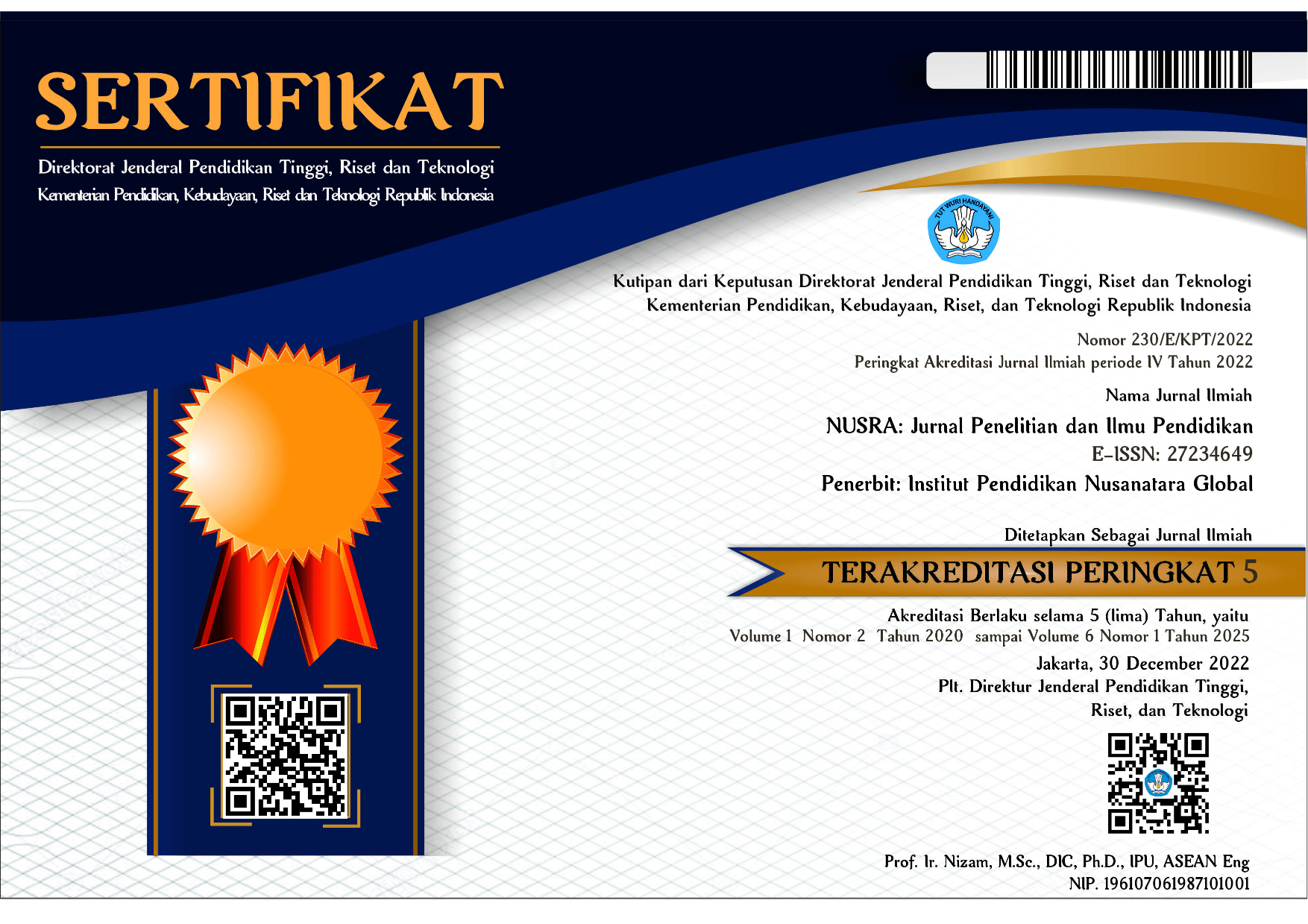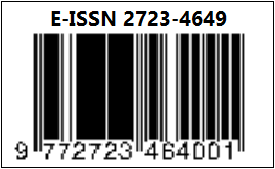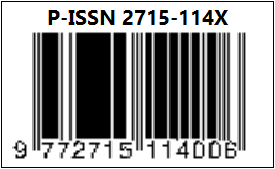Penerapan Model Pembelajaran Problem Based Learning Berbantuan Permainan Edukatif untuk Meningkatkan Hasil Belajar Matematika Pada Materi Data Di Kelas V B SDN 105 Pekanbaru
DOI:
https://doi.org/10.55681/nusra.v6i3.3751Keywords:
PBL Learning, Educational Games, Learning Outcomes, DataAbstract
The purpose of this study was to determine whether the PBL learning model assisted by educational games could improve students' learning outcomes on the subject of flat shapes. This research was conducted in class V B SDN 105 Pekanbaru. The subjects of this study were 33 students which including 19 male students and 14 female students. The research model applied was classroom action research, consisting of two cycles. The teaching and learning process in each cycle is composed of four stages, namely: planning, implementation, observation, and reflection. The data in this study were obtained through tests and observations and then analyzed using descriptive presentation techniques. Based on the results of data analysis obtained in cycle 1, the average learning outcomes obtained by students were 83.0, with a percentage of completeness of 84.6%. The average learning outcomes of students in cycle 2 increased to 85.5, with a percentage of completeness of 91%. The percentage of completeness in cycle 2 is relatively large, which shows that the application of the PBL model assisted by educational games can advance students' mathematics learning outcomes on the subject of data.
Downloads
References
Ariffin, N. A. N., Ramli, N., Nik Badrul Alam, N. M. F. H., Yusof, Y., & Suparian, A. (2022). Effectiveness of gamification in teaching and learning mathematics. Journal on Mathematics Education, 13(1), 173-190. https://doi.org/10.22342/jme.v13i1.pp173-190
Arikunto, S. (2017). Dasar-dasar Evaluasi Pendidikan. Jakarta: Bumi Aksara.
Astuti, D. & Pratiwi, R. (2020). Pengaruh Model Pembelajaran terhadap Hasil Belajar Matematika Siswa. Jurnal Pendidikan Matematika, 8(2), 123-131
Boom-Cárcamo, E., Buelvas-Gutiérrez, L., Acosta-Oñate, L., & Boom-Cárcamo, D. (2024). Gamification and problem-based learning (PBL): Development of creativity in the teaching-learning process of mathematics in university students. Thinking Skills and Creativity, 53, 101614. https://doi.org/10.1016/j.tsc.2024.101614
Cahyaningsih, U., Jatisunda, M.G., Kurniawan, D.T., Nahdi, D.S., Utami, W.P., & Halipah, R. (2023). Implementing problem-based learning to enhance students mathematical proficiency in primary school. Jurnal Didaktik Matematika, 10(2), 281- 299. DOI: https://doi.org/10.24815/jdm.v10i2.32615
Deterding, S. (2012). Gamification: designing for motivation. Interactions, 19(4), 14-17. https://doi.org/10.1145/2212877.2212883
Elizabeth, A., & Sigahitong, M. M. (2018). Pengaruh Model Problem Based Learning Terhadap Kemampuan Berpikir Kreatif Peserta Didik SMA. Prisma Sains : Jurnal Pengkajian Ilmu Dan Pembelajaran Matematika Dan IPA IKIP Mataram, 6(2), 66. https://doi.org/10.33394/j ps.v6i2.1044.
Fatwa Patimah Nursahada. (2014), Pengaruh Metode Pembelajaran dan Sikap Siswa Pada Pelajaran IPA Terhadap Hasil Belajar IPA. Jurnal Formatif. Vol. 4 No. 2
Fuentes-Cabrera, A., Parra-González, M. E., López-Belmonte, J., & Segura-Robles, A. (2020). Learning mathematics with emerging methodologies-The escape room as a case study. Mathematics, 8(9), 1-14. https://doi.org/10.3390/math8091586
Hidayati, N. (2019). Peran Keaktifan Siswa dalam Pembelajaran Matematika. Jurnal Pendidikan Dasar, 10(1), 45-52
Hidayati, P., Safrizal, S., & Fadriati, F. (2023). Analisis faktor penyebab rendahnya hasil belajar matematika pada siswa kelas V sekolah dasar. Limas Pendidikan Guru Madrasah Ibtidaiyah, 4(1), 46-58.
Hui-Chuan Li & Andreas J. Stylianides (2017): An examination of the roles of the teacher and students during a problem-based learning intervention: lessons learned from a study in a Taiwanese primary mathematics classroom, Interactive Learning Environments To link to this article: http://dx.doi.org/10.1080/10494820.2017.1283333
Kunandar (2011). Langkah Mudah Penelitian Tindakan Kelas Sebagai. Pengembangan Profesi Guru.Jakarta:Rajawali Pres.
Lapuh Bele, J., Bele, D., & Debevc, M. (2016). Gamification as a method for increasing e-learning motivation. In Proceedings of the 9th annual International Conference of Education, Research and Innovation (Vol. 1, pp. 5227-5235). Seville, Spain: IATED. https://doi.org/10.21125/iceri.2016.2263
Lee, J. J., & Hammer, J. (2011). Gamification in Education: What, How, Why Bother?. Academic Exchange Quarterly, 15(2), 1-5. Retrieved from https://www.academia.edu/570970/Gamification_in_Education_What_How_Why_Bother
Mohd. Yusof, N. A., & Shahrill, M. (2021). The effects of non-digital game-based learning on students’ mathematical perspectives and achievements. Southeast Asian Mathematics Education Journal, 11(1), 25-40. https://doi.org/10.46517/seamej.v11i1.113
Mora, A., Riera, D., González, C., & Arnedo-Moreno, J. (2017). Gamification: A systematic review of design frameworks. Journal of Computing in Higher Education, 29(3), 516-548. https://doi.org/10.1007/s12528-017-9150-4
Ofosu-Ampong, K. (2020). The shift to gamification in education: A review on dominant issues. Journal of Educational Technology Systems, 49(1), 113-137. https://doi.org/10.1177/0047239520917629
Rahmawati, D. & Suyitno, H. (2021). Efektivitas Model Problem Based Learning dalam Meningkatkan Hasil Belajar Matematika. Jurnal Pendidikan Matematika Indonesia, 6(1), 15-22.
Robertson, J., & Howells, C. (2008). Computer game design: Opportunities for successful learning. Computers and Education, 50(2), 559-578. https://doi.org/10.1016/j.compedu.2007.09.020
Sánchez, S. P., Belmonte, J. L., Cabrera, A. F., & Núñez, J. A. L. (2020). Gamification as a methodological complement to flipped learning an incident factor in learning improvement. Multimodal Technologies and Interaction, 4(2), 1-13. https://doi.org/10.3390/mti4020012
Sari, D. & Widayati, N. (2020). Penggunaan Permainan Edukatif untuk Meningkatkan Hasil Belajar Matematika. Jurnal Inovasi Pendidikan, 4(3), 211-218.
Savery, J. R. (2015). Overview of problem-based learning: Definitions and distinctions. Interdisciplinary Journal of Problem-based Learning, 1(1), 9-20.
Smiderle, R., Rigo, S. J., Marques, L. B., Peçanha de Miranda Coelho, J. A., & Jaques, P. A. (2020). The impact of gamification on students’ learning, engagement and behavior based on their personality traits. Smart Learning Environments, 7(3), 1-11. https://doi.org/10.1186/s40561-019-0098-x
Suryani, N. (2018). Analisis Kesulitan Belajar Matematika pada Materi Pengolahan Data. Jurnal Pendidikan Matematika, 7(2), 98-105.
Widoretno, Sri., dkk. 2021. Efektivitas Game Edukasi Sebagai Media Pembelajaran Anak. Prosiding Transformasi Pembelajaran Nasional 2021, Vol. 1
Downloads
Published
How to Cite
Issue
Section
License
Copyright (c) 2025 Wira Pratiwi, Amelia Syafitri, Jihan Salsabillah Misel, Muhammad Ichsan AlHafizh, Putri Rima Khairunnisa, Intan Katika Sari, Kusmega Dewi

This work is licensed under a Creative Commons Attribution-ShareAlike 4.0 International License.














